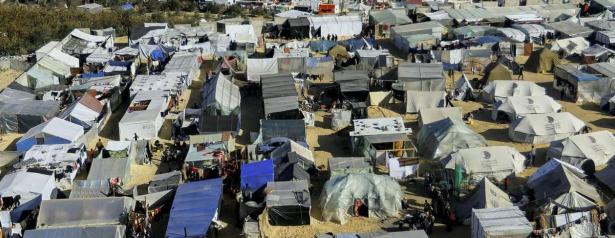The right wants more, more, more. So do many Israelis who don't consider themselves right-wingers. All the dead, disabled, displaced and starving Gazans up to now are not enough. They want more.
Outside the home of the head of the right-wing government on Jerusalem's Gaza (in Hebrew, Azza) Street, a right-wing rally will take place Thursday evening: "We demand victory! Rafah now."
A disaster-stricken city of refuge, into which Israel stuffed over a million orphaned, bereaved, hungry, disabled and destitute people, has become a target for satisfying the entirety of desire; half will not do. There is no victory without Rafah.
In the Six-Day War we sang: "We are past Rafah / As you wanted, Tal!" to please Maj. Gen. Israel Tal, in a peak moment of the personality cult surrounding our generals. Now we seek to placate the goddess of victory. Peace Now, of which little remains apart from the memories, was founded in 1978. In 2024, Rafah Now was established.
In 1984, Israel established the settlement Rafah Yam, which grew organic cherry tomatoes on occupied land on the shore of the Mediterranean Sea in Gaza. Now Israel wants "Rafah Dam [in Hebrew, Blood]. Perhaps Rafah Yam will also be rebuilt.
This sequence of associations is crazy. The history of Israel's wars in a nutshell, from the conquest of Rafah to the conquest of Rafah, through settlements and peace movements and all the follies and evil that were sown along the way.
On the eve of the possible conquest of Rafah, one camp demands Rafah and another camp demands the release of the hostages. No one says no to the conquest of Rafah. No reservist threatens to refuse to serve in Rafah, if Israel invades the city. In the face of the lust for blood and revenge there is no opposing camp. Only against Benjamin Netanyahu, the primary culprit but not the only one, is there a determined camp.
There is no opposition to war, as we have said since the day it began. Not after six months, either. The call "No to Rafah" is heard only from Washington, not Kaplan Street. The call "No to Rafah" is still not strong enough even from Washington. It is not yet joined by concrete threats. Only Washington can save Rafah now, and Rafah must be saved. Its residents and refugees have suffered enough.
It is hard to know what is going through Netanyahu's mind when he says a date has already been set for Rafah. Is it all about catering to his coalition partners? Does he genuinely believe that if we only conquer Rafah, victory will be won? And when he says "no" to the Americans, what does he mean? "Not now"? Does he mean it? Perhaps his "no" is more inviting than "yes"? Without Rafah, the war is over. With Rafah, the war has not reached its peak.
Thousands will stand on Azza Street in the heart of Jerusalem Thursday evening and demand Rafah's invasion. What exactly is going through their minds? What do they think they'll achieve besides the full satisfaction of their bloodlust? Have any of them seen the pictures from Rafah? And if so, did they care?
Norwegian radio aired the story this week of an elderly detainee from Gaza who was released from one of the detention camps Israel has built after his right hand and left leg were amputated, presumably as a result of damage caused by prolonged periods in restraints. It won't matter to the people on Azza Street. The rest of the Israelis who don't read Haaretz don't know what is happening in the Sde Teiman detention camp. Most of them don't want to know.
There will be no victory in this war; we knew that from the start. Maybe a miracle will occur and there will be no Gaza invasion. But the lust for Rafah is horrifying. Is it only bloodthirstiness? Hatred of Palestinians and the desire to avenge October 7?
And perhaps it's also the real estate that beckons again, as in 1967? The people who will stand on Azza Street Thursday evening and demand the destruction of the largest city of refuge in the world today – after we destroyed everything to its north – are evil people. They are also delusional: No victory awaits in Rafah's Shaboura refugee camp.
[Gideon Levy, who was born and resides in Tel Aviv, Israel, is a columnist and member of the editorial board at Haaretz daily newspaper, where he has covered the Israeli occupation of the West Bank and Gaza for the last 25 years. He joined Haaretz in 1982. The author of The Punishment of Gaza. He has received several peace and freedom awards for his work.He was the recipient of the Euro-Med Journalist Prize for 2008; the Leipzig Freedom Prize in 2001; the Israeli Journalists’ Union Prize in 1997; and The Association of Human Rights in Israel Award for 1996. In 2015 Levy and Palestinian pastor Mitri Raheb were awarded The 2015 Olof Palme Prize “for their courageous and indefatigable fight against occupation and violence, and for a future Middle East characterized by peaceful coexistence and equality for all.”]


Spread the word